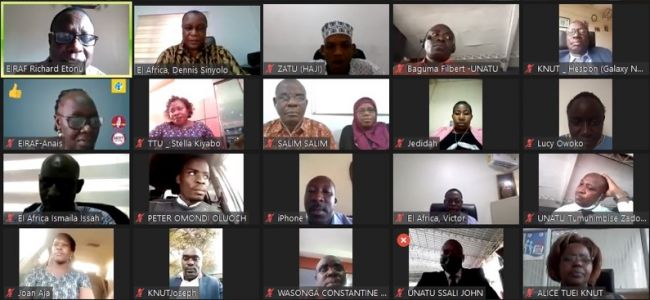EI Africa Capacity Building moves to East Africa
Education International Africa (EI) organised a two-day Capacity Building subregional Workshop for East Africa. The workshop took place from the 15th to the 16th of September 2021. It was attended by more than 40 senior union leaders, women, and young leaders from Kenya (KUPPET, KNUT, UASU), Rwanda (SNER, SYNEDUC, SYPERWA), Tanzania (TTU), Uganda (UNATU), and Zanzibar (ZATU).
The workshop, the second in a series of workshops for EI Africa member organisations, aimed at building the capacity of member organisations to engage more effectively on policy, social dialogue, and collective bargaining, enhancing member organisations’ capacity to organise and mobilise their members through the use of digital technologies, fostering unity, collaboration, and solidarity among EI member organisations in individual countries, in EIRAF zones and in the region.
In his opening remarks, Dr Dennis Sinyolo, Regional Director of EI, stated that building the capacity of teachers for remote and hybrid teaching is a must. He highlighted that technology cannot replace teachers, but with appropriate use, it can be a powerful tool for enhancing their work. He encouraged members to use the
EI Africa Framework on Hybrid and Remote Teaching and Learning adopted in May to inform and support national advocacy and other efforts.
He later urged governments to:
- invest in protective and preventive measures, including vaccines for all who need them;
- meet the internationally agreed education financing benchmarks of investing at least 20% of the national budget or at least 6% of GDP in education;
- provide adequate school infrastructure and equipment, involve teachers and their unions in genuine social and policy; and,
- uphold international labour standards,ratify, and fully implement ILO core Conventions, particularly Convention 87 on Freedom of Association and Protection of the Right to Organise and Convention 98 on the Right to Organise and Collective Bargaining.
The workshop also gave the opportunity to participants to analyse their unions’ strengths, weaknesses and opportunities for renewal, growth, and development; to improve their advocacy and lobbying skills in order to push governments to fulfil their commitment to equitable quality education for all by 2030; to better manage their unions and improve service delivery to members; and, to work more collaboratively with sister unions both within our countries and the sub-region.
The participating unions initiated a strategic plan that would be implemented and reviewed in 2023. Similar workshops will be held for West Africa, Central Africa, and the Arab speaking countries.
‘Unity and collaboration are absolutely essential if we are to overcome present and future challenges confronting the teacher trade union movement in Africa. An injury to one is an injury to all !’, Sinyolo said in his concluding remarks.

[Mon, 20 Sep 2021 11:00:00 +0000] | DIGG THIS
Education International · No. 3 Torshie Close, · Mempeasem · East Legon Extension · Accra · Ghana
Phone: +233.302.50.12.00 · Fax: +233.302.50.66.81 · Email: eirafoffice@ei-ie.org
Website Development and Design by Cyblance
